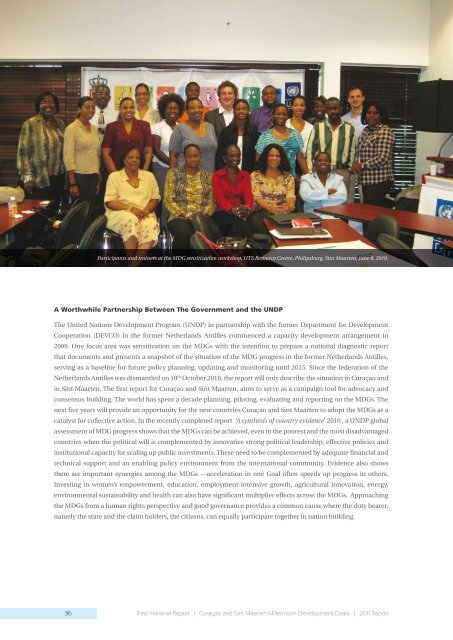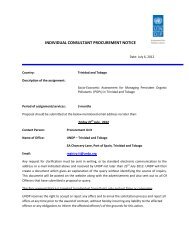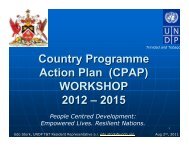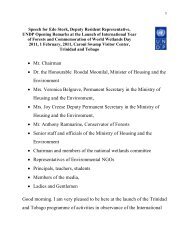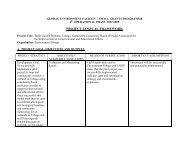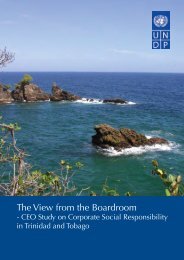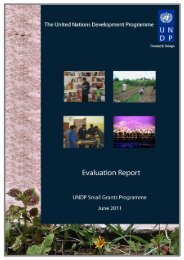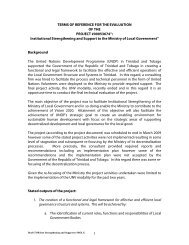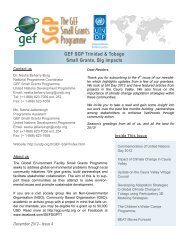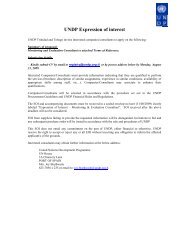Curaçao & Sint Maarten - UNDP Trinidad and Tobago
Curaçao & Sint Maarten - UNDP Trinidad and Tobago
Curaçao & Sint Maarten - UNDP Trinidad and Tobago
Create successful ePaper yourself
Turn your PDF publications into a flip-book with our unique Google optimized e-Paper software.
Participants <strong>and</strong> trainers at the MDG sensitization workshop, UTS Resource Centre, Philipsburg, <strong>Sint</strong> <strong>Maarten</strong>, June 8, 2010.<br />
A Worthwhile Partnership Between The Government <strong>and</strong> the <strong>UNDP</strong><br />
The United Nations Development Program (<strong>UNDP</strong>) in partnership with the former Department for Development<br />
Cooperation (DEVCO) in the former Netherl<strong>and</strong>s Antilles commenced a capacity development arrangement in<br />
2009. One focus area was sensitization on the MDGs with the intention to prepare a national diagnostic report<br />
that documents <strong>and</strong> presents a snapshot of the situation of the MDG progress in the former Netherl<strong>and</strong>s Antilles,<br />
serving as a baseline for future policy planning, updating <strong>and</strong> monitoring until 2015. Since the federation of the<br />
Netherl<strong>and</strong>s Antilles was dismantled on 10th October 2010, the report will only describe the situation in <strong>Curaçao</strong> <strong>and</strong><br />
in <strong>Sint</strong> <strong>Maarten</strong>. The first report for <strong>Curaçao</strong> <strong>and</strong> <strong>Sint</strong> <strong>Maarten</strong>, aims to serve as a campaign tool for advocacy <strong>and</strong><br />
consensus building. The world has spent a decade planning, piloting, evaluating <strong>and</strong> reporting on the MDGs. The<br />
next five years will provide an opportunity for the new countries <strong>Curaçao</strong> <strong>and</strong> <strong>Sint</strong> <strong>Maarten</strong> to adopt the MDGs as a<br />
catalyst for collective action. In the recently completed report ‘A synthesis of country evidence’ 2010 , a <strong>UNDP</strong> global<br />
assessment of MDG progress shows that the MDGs can be achieved, even in the poorest <strong>and</strong> the most disadvantaged<br />
countries when the political will is complemented by innovative strong political leadership, effective policies <strong>and</strong><br />
institutional capacity for scaling up public investments. These need to be complemented by adequate financial <strong>and</strong><br />
technical support <strong>and</strong> an enabling policy environment from the international community. Evidence also shows<br />
there are important synergies among the MDGs —acceleration in one Goal often speeds up progress in others.<br />
Investing in women’s empowerment, education, employment-intensive growth, agricultural innovation, energy,<br />
environmental sustainability <strong>and</strong> health can also have significant multiplier effects across the MDGs. Approaching<br />
the MDGs from a human rights perspective <strong>and</strong> good governance provides a common cause where the duty bearer,<br />
namely the state <strong>and</strong> the claim holders, the citizens, can equally participate together in nation building.<br />
36 First National Report | <strong>Curaçao</strong> <strong>and</strong> <strong>Sint</strong> <strong>Maarten</strong> Millennium Development Goals | 2011 Report


